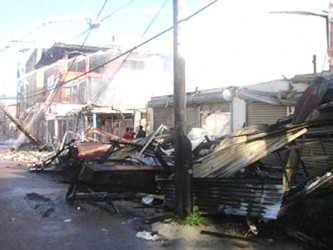President of the George-town Chamber of Com-merce and Industry (GCCI) Clinton Urling says the chamber wants to see an increased level of private sector compliance with codes and regulations relating to fire safety.
“Our companies have the responsibility of implementing and maintaining internal fire risk management programmes,” Urling wrote in a comment prepared for Stabroek Business. He said the chamber would wish to see business enterprises incorporating responsibilities for fire safety into their overall security operations.

“For medium and large companies, inspections and fire drill protocols should be adopted and executed regularly while management should require regular inspection reports from the individuals and departments concerned in order to ensure organizational compliance,” he added.
Urling’s comment which comes in the wake of several fires in the commercial belt during 2011 and 2012 is likely to find support with Chief Fire Officer Marlon Gentle who has voiced his frustration to this newspaper over indifference to fire codes and protocols among sections of the business community.
Gentle has pointed to ageing and faulty electrical wiring, faulty electrical appliances and the storage of excessive amounts of flammable material on business premises as being among the leading fire hazards.
Urling, meanwhile, commented that along with the importance of business entities attaching a higher level of importance to fire safety measures, there was an urgent need for an upgrading of the capacity of the Guyana Fire Service if it is to perform its functions efficiently.
The GCCI President said that the upgrading of fire stations, significantly increased resources and more exposure of fire officers to overseas training in order to have them benefit from “new and innovative approaches to fire prevention and fighting” were among the measures needed to improve the quality of the service provided.
He outlined a number of measures which he said the government needs to take in support of fire prevention. He called for the creation of “proper legislation… to enforce the fines and penalties for fire code violations. Moreover, legislation specifically outlining a checklist of prerequisites that property owners must comply with should be moved for consideration in Parliament and passed as law,” Urling said.
“With the emergence of many new housing schemes and the success of businesses in remote and interior communities as a result of the boom in the mining sector, it makes good sense for the government to consider the outsourcing of inspections to the private sector. The GFS does not have to go it alone.” He said that involving the private sector in the inspection process can be accomplished by “adopting a licensing system that allows for authorised fire safety and prevention engineers or companies to perform fire inspections of premises, conduct investigations and surveys, develop and review fire safety and fire evacuation plans, and other essential functions.
“Standards should be rigorous enough to allow the courts to properly accept testimony from duly licensed private contractors, who also could serve as expert witnesses in court cases,” he added.
And Urling said government also needs to address “fire hydrant performance and maintenance, along with the underground water distribution system that connects to hydrants.
“We have to accelerate the essential reforms to upgrade what we have currently so that our fire fighters are in a more capable position to respond immediately and effectively to emergencies.”





